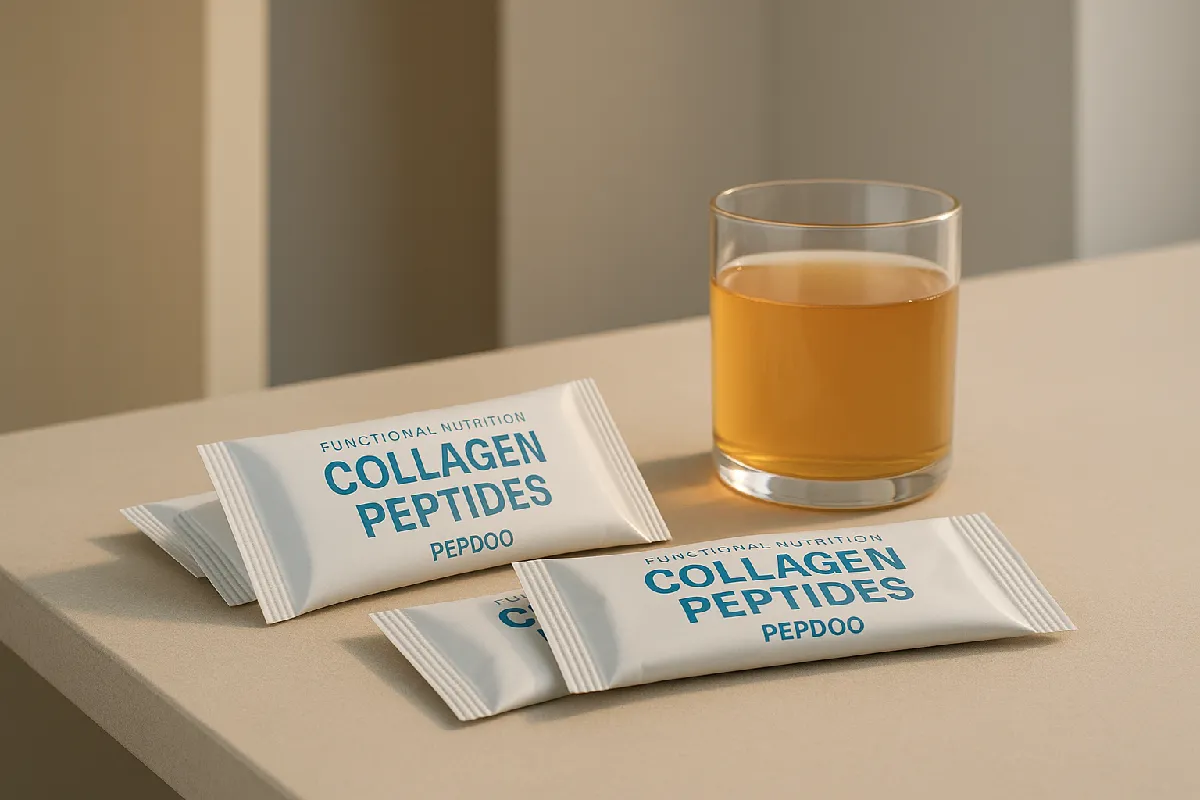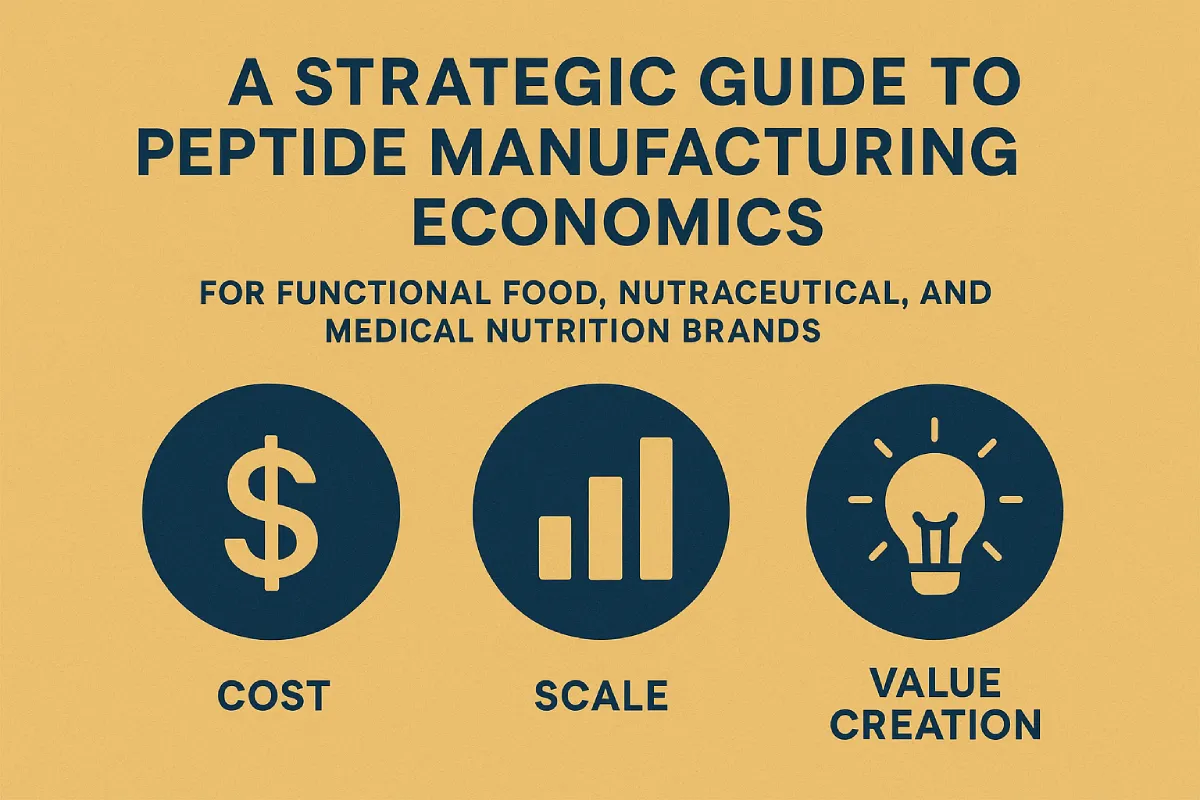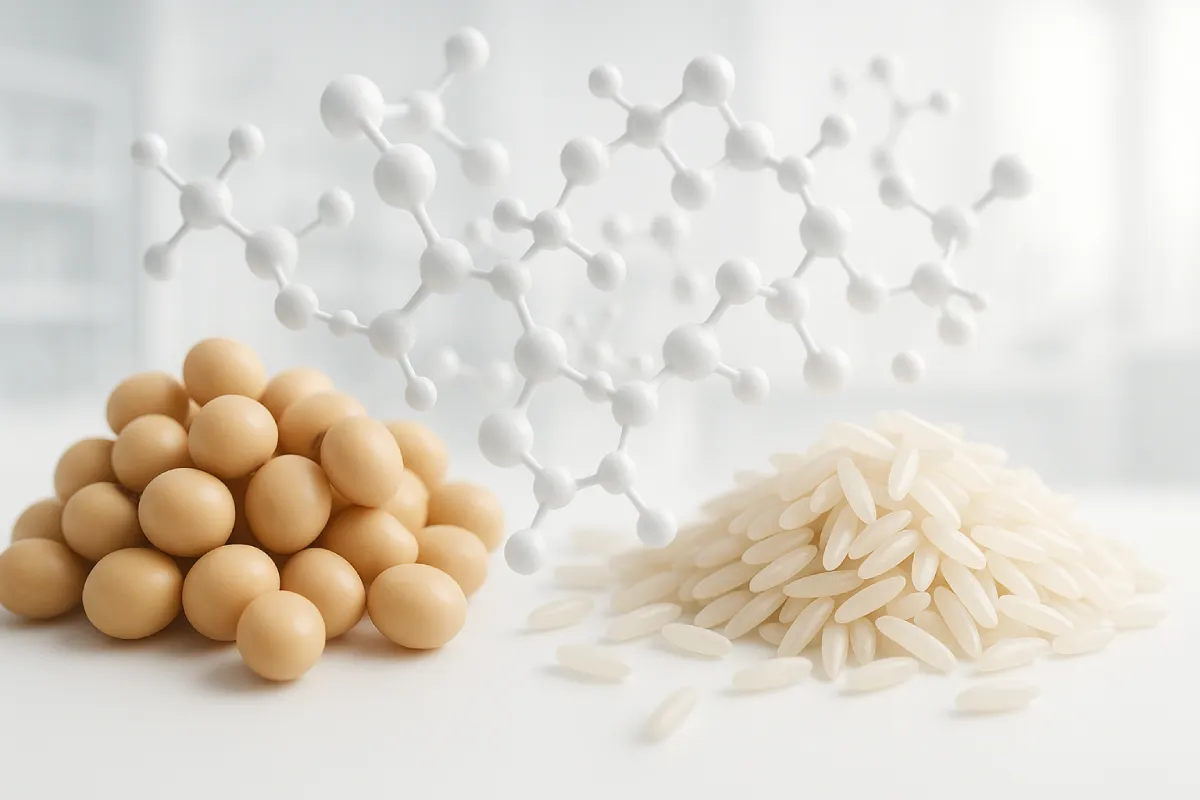1. Introduction: Rice Peptide—A Functional Protein Beyond Traditional Nutrition
In the evolving landscape of functional nutrition, rice peptides have emerged as a pivotal ingredient, offering a range of bioactive benefits that extend beyond traditional protein sources. Derived from rice protein through enzymatic hydrolysis, these peptides exhibit unique properties that make them suitable for various applications in functional foods, dietary supplements, and medical nutrition.
As a leading manufacturer of bioactive peptides, we pride ourselves on being at the forefront of the industry. Our company is recognized as a full-spectrum peptide producer in China, holding a significant number of patents in the field of small molecular peptides. We are also actively involved in the formulation of industry standards for peptide products, ensuring the highest quality and compliance with international regulations. Our state-of-the-art peptide production technology positions us as a trusted partner for businesses seeking innovative and effective functional ingredients.
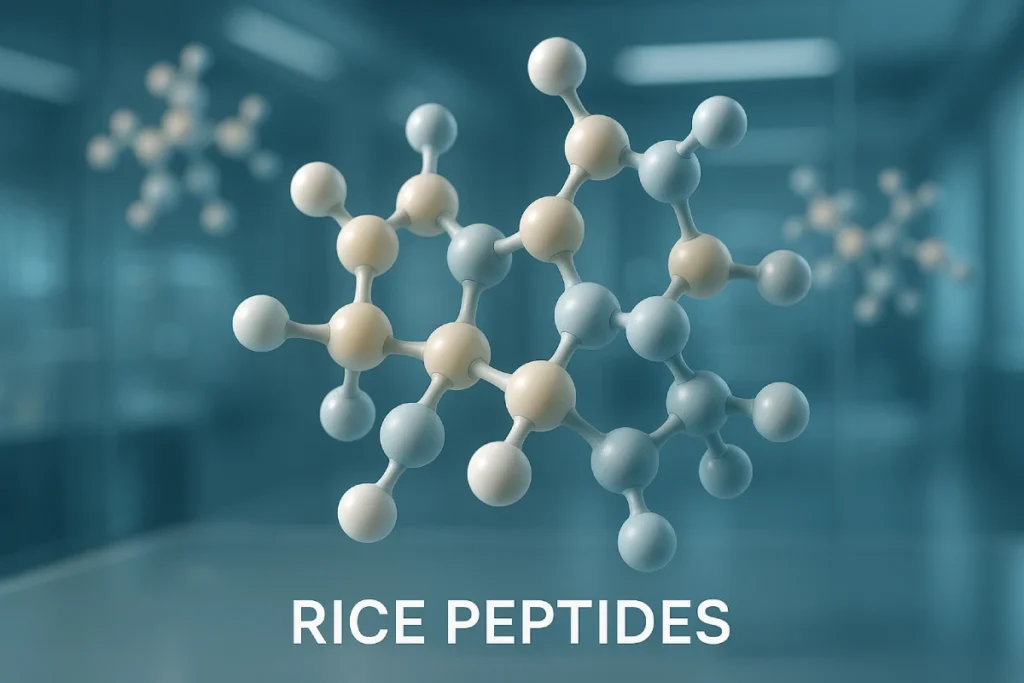
2. From Rice Protein to Bioactive Peptides: Unlocking Functional Potential
Rice protein, a byproduct of rice milling, is rich in essential amino acids and exhibits hypoallergenic properties, making it an attractive alternative to animal-based proteins. Through controlled enzymatic hydrolysis, rice protein is broken down into smaller peptides with specific sequences that confer bioactive activities. These bioactive peptides have been shown to possess antioxidant, anti-inflammatory, and antihypertensive effects, among others.
The molecular weight distribution and specific amino acid sequences of these peptides significantly influence their bioactivity. For instance, peptides such as Leu-Arg-Ala (LRA) have demonstrated potent antihypertensive effects through mechanisms like vasodilation and nitric oxide production enhancement. Other peptides exhibit antioxidant properties by scavenging free radicals and reducing oxidative stress, which is linked to various chronic diseases ([1], [2]).
3. Functional Benefits of Rice Peptides for Modern Formulations
3.1 Metabolic & Glycemic Health Support
Rice peptides have shown promise in supporting metabolic health and regulating blood glucose levels. Studies have identified peptides from rice bran protein that possess antihypertensive properties, which can be beneficial in managing blood pressure and reducing the risk of cardiovascular diseases ([1]).
3.2 Anti-inflammatory and Antioxidant Effects
The antioxidant and anti-inflammatory properties of rice peptides make them valuable in combating oxidative stress and inflammation, both of which are implicated in the pathogenesis of various chronic diseases. Incorporating these peptides into formulations can enhance the health benefits of functional foods and supplements ([2]).
3.3 Gut Health and Nutrient Absorption
Rice peptides contribute to gut health by promoting the growth of beneficial gut microbiota and enhancing nutrient absorption. Their incorporation into functional foods can support digestive health and improve the bioavailability of nutrients, making them an excellent addition to dietary supplements aimed at gut health ([3]).
4. Applications in B2B Functional Nutrition Formulations
4.1 Functional Foods & Beverages
Rice peptides can be incorporated into various functional foods and beverages, including protein drinks, meal replacements, and energy bars. Their hypoallergenic nature and functional benefits make them suitable for plant-based and clean-label products, catering to the growing consumer demand for natural and health-promoting ingredients.
4.2 Dietary Supplements
In the dietary supplement sector, rice peptides serve as a valuable ingredient in capsules, tablets, and powders. Their bioactive properties support various health claims, such as antioxidant support, cardiovascular health, and metabolic regulation, aligning with consumer preferences for supplements that offer multiple health benefits.
4.3 Medical Nutrition & FSMP
Rice peptides are particularly beneficial in medical nutrition and Foods for Special Medical Purposes (FSMP), where they can provide targeted nutritional support for individuals with specific health conditions. Their digestibility and hypoallergenic properties make them suitable for formulations aimed at patients with dietary restrictions or sensitivities.
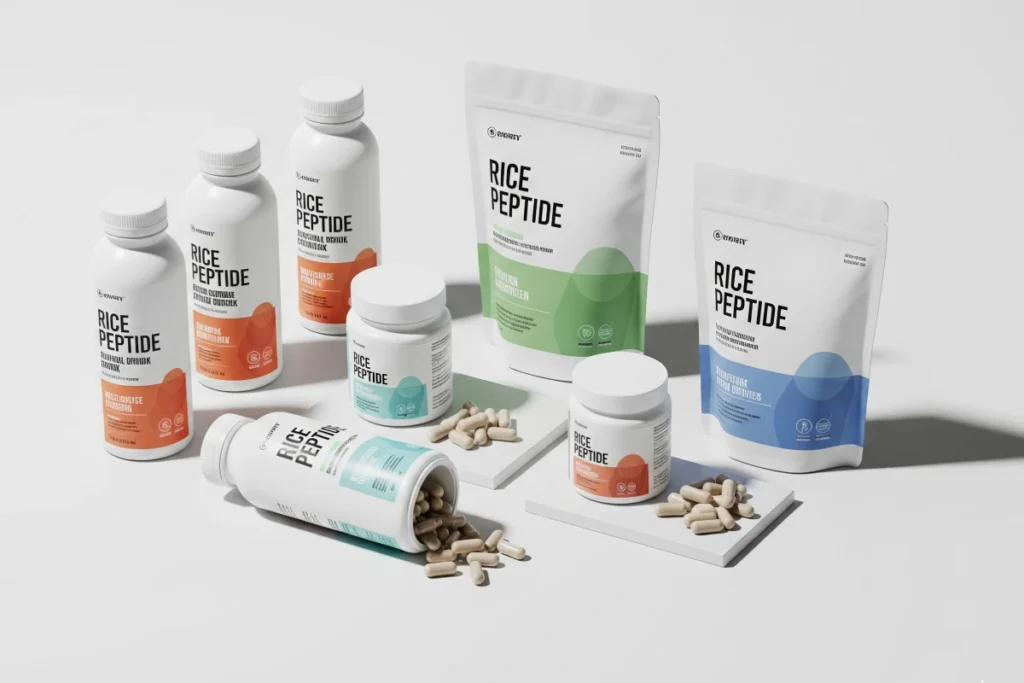
5. Market Trends and Regulatory Insights
The global market for bioactive peptides is experiencing significant growth, driven by increasing consumer awareness of health and wellness and the rising demand for functional ingredients. The market is projected to expand from USD 1.2 billion in 2024 to USD 2.5 billion by 2030, with a compound annual growth rate (CAGR) of approximately 12% ([7]).
In China, the rice protein peptide market holds a substantial share, attributed to the country’s large rice production capacity and growing health-conscious consumer base. The government’s support for the development of the domestic food and beverage industry further fuels the market’s expansion ([7]).
Regulatory considerations are paramount in the development and commercialization of peptide-based products. Adhering to i
6. Why Partner with a Leading Peptide Manufacturer?
Collaborating with a reputable peptide manufacturer offers several advantages:
- Expertise and Innovation: Leverage the manufacturer’s knowledge and experience in peptide production to develop innovative and effective formulations.
- Quality Assurance: Ensure product quality and compliance with industry standards through rigorous testing and quality control processes.
- Customization: Access to a range of peptide products and the ability to customize formulations to meet specific health claims and target markets.
- Regulatory Support: Benefit from the manufacturer’s understanding of regulatory requirements and assistance in navigating the approval process.
Our company, as a full-spectrum peptide producer with a strong patent portfolio and involvement in industry standard formulation, is well-positioned to support your business in developing high-quality peptide-based products that meet market demands and regulatory standards.
7. Conclusion: Rice Peptide—Next-Generation Functional Ingredient for B2B Brands
Rice peptides represent a next-generation functional ingredient that offers a multitude of health benefits and versatile applications in the nutrition and wellness industry. Their incorporation into functional foods, dietary supplements, and medical nutrition products can enhance product offerings and meet the growing consumer demand for health-promoting ingredients.
By partnering with a leading peptide manufacturer, businesses can access high-quality rice peptide products and benefit from expert support in formulation, quality assurance, and regulatory compliance. Together, we can develop innovative solutions that cater to the evolving needs of health-conscious consumers.
Partner with a Leading Peptide Manufacturer Today
Access high-quality rice peptides, expert formulation support, and customized solutions for your functional foods, supplements, and medical nutrition products.
Contact Our B2B TeamFAQ
Rice peptides are enzymatically hydrolyzed fragments of rice protein with defined bioactive sequences. Unlike intact rice protein, they offer superior digestibility, targeted bioactivity (e.g., antioxidant, antihypertensive, metabolic support), and improved solubility. For B2B brands, this allows formulation of clean-label, plant-based products with specific health claims ([1], [2]).
Rice peptides are versatile and can be incorporated into beverages, powders, capsules, tablets, or medical nutrition formulas. Our technical team provides guidance on optimal dosages, solubility, stability, and synergistic blending with other functional peptides (e.g., collagen, soy) to achieve desired health benefits and sensory profiles.
Yes. Rice peptides are plant-based, free from common allergens such as dairy, gluten, and soy, and fully suitable for vegan and hypoallergenic formulations. This makes them ideal for functional foods targeting sensitive populations, elderly nutrition, or FSMP (Foods for Special Medical Purposes).
Absolutely. We provide end-to-end support for B2B clients, including peptide selection, dosage optimization, and bioactivity validation to support claims such as cardiovascular support, metabolic regulation, anti-inflammatory effects, gut health, or sports nutrition. Customization is guided by both scientific evidence and regulatory compliance.
We are a full-spectrum peptide manufacturer with advanced production technology, holding numerous patents and participating in industry standard setting. Each batch undergoes rigorous quality control, including purity testing, bioactivity assays, and microbiological safety checks, ensuring regulatory compliance for global markets.
Yes. Rice peptides can be synergistically combined with other peptides (collagen, soy), vitamins, minerals, probiotics, or plant extracts. Our R&D team assists in compatibility studies to maintain peptide activity and overall product stability, helping brands deliver differentiated functional products.
Partnering with us provides reliable supply, technical support, R&D collaboration, and regulatory guidance. B2B clients gain access to high-quality peptides, patent-backed technologies, and tailored formulations to accelerate product development and market entry, reducing risk and time-to-market.
Yes. Functional beverage brands have used rice peptides to create low-GI protein drinks, while dietary supplement companies have developed antioxidant-focused powders and capsules. In FSMP, rice peptides improved digestibility and nutrient absorption in medical nutrition products. These cases demonstrate scalability and proven efficacy for B2B applications.
References
- Shobako, S., et al. (2020). Anti-hypertensive effects of peptides derived from rice bran protein. MDPI.
- Bioactive peptides, applications, safety, and health benefits. (2021). PMC.
- Bioactive Peptides: An Overview. (2021). News-Medical.
- Rice Protein Peptide Powder Market Strategies for the Next Decade. (2025). Market Report Analytics.
- Functional nutritional rice: current progresses and future prospects. (2024). Frontiers in Plant Science.
- Bioactive peptides from brown rice protein hydrolyzed by bromelain. (2019). Wiley Online Library.
- Bioactive Peptides: A Review. (2020). Food Quality and Safety.
- Bio-active Peptide Market Size, Share, Demand, Trends 2034. (2023). Fact.MR.
- Anti-Hypertensive Effects of Peptides Derived from Rice Bran Protein. (2020). MDPI.
- Bioactive Peptides: An Overview. (2021). News-Medical.


